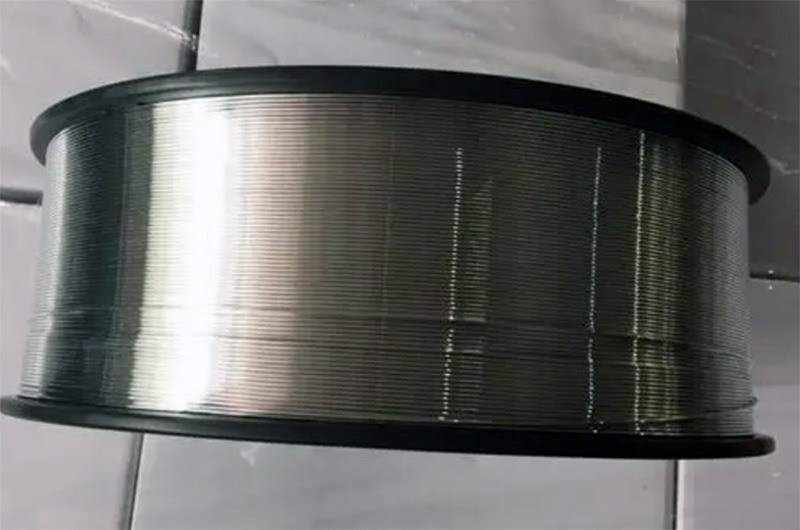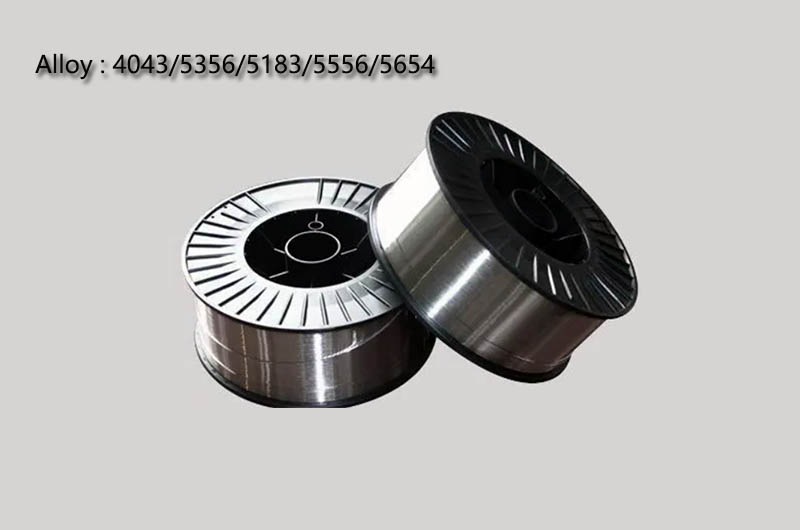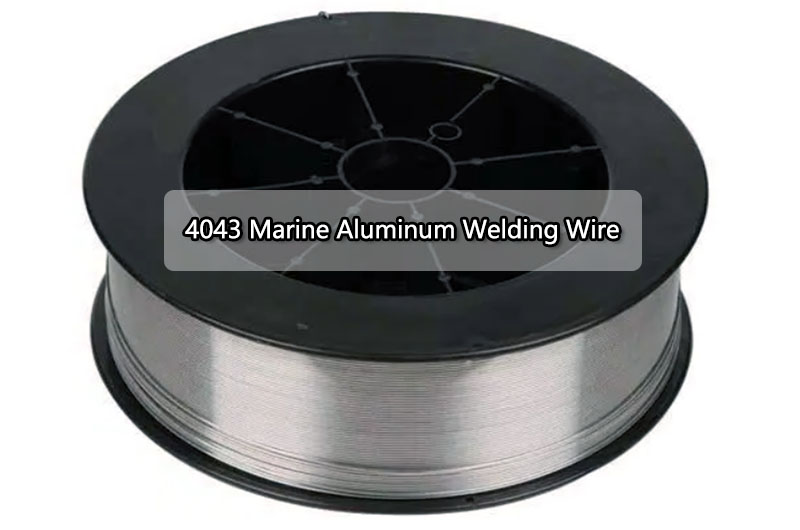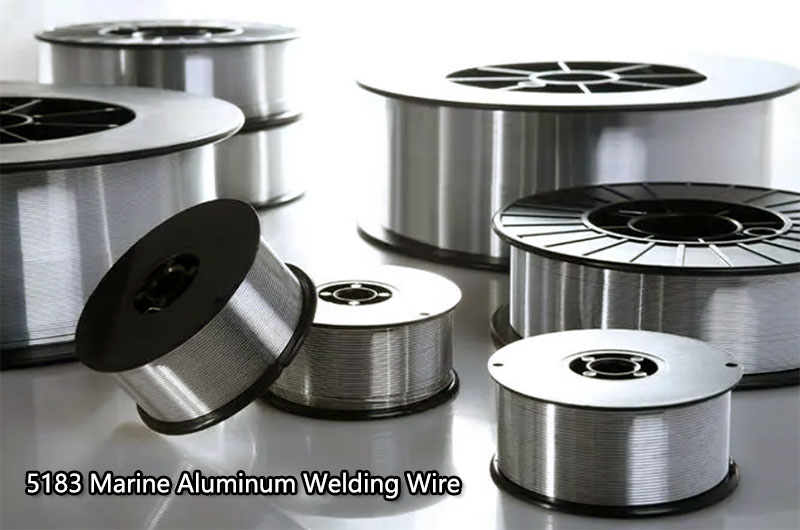Marine Aluminum Welding Wire
Alloy: 4043/5356/5183/5556/5654 Wire Diameter: 0.030 - 0.094 inches
Marine aluminum welding wire is a kind of welding consumable specially used for welding marine aluminum alloys. Aluminum is widely used in the marine industry due to its excellent corrosion resistance, lightweight properties, and high strength-to-weight ratio.
Due to the unique properties of the material, specialized techniques and equipment are required when welding aluminum. Aluminum has a lower melting point and higher thermal conductivity than other metals such as steel, which means it requires specific welding processes and consumables.

Marine Aluminum Welding Wire Properties
- Corrosion Resistance: Aluminum is known for its excellent corrosion resistance, which is especially important in marine environments where they are often exposed to salt water and other corrosive elements. Aluminum marine welding wire is designed to maintain the corrosion resistance of the parent metal.
- Tensile Strength: Tensile strength measures the maximum stress that a material can withstand under tension without breaking. Aluminum marine welding wire exhibits different tensile strength values depending on the alloy and manufacturing process.
- Yield Strength: Yield strength is the stress level at which a material begins to deform plastically. It represents the point at which permanent deformation occurs. Aluminum marine welding wire usually has a specified yield strength value.
- Elongation: Elongation is a measure of a material's ability to stretch or deform before breaking. It indicates the ductility or flexibility of the material. Aluminum marine welding wire usually has a specified elongation value, which may vary depending on the alloy and wire composition.
- Weldability: Marine aluminum welding wire is designed for good weldability, resulting in strong and reliable welded joints. They should provide good arc stability, minimal spatter, and suitable flow characteristics during welding.

Marine Aluminum Welding Wire Specifications
Marine aluminum welding wire specifications may vary by specific product and manufacturer. However, here are some common specifications to consider when selecting aluminum welding wire for marine use:
- Alloy Type: Aluminum marine welding wires are usually available in ER4043, ER5356, ER5183, ER5556 and ER5654.
- Wire Diameter: Aluminum marine welding wire comes in different diameters, typically ranging from 0.8 mm to 2.4 mm (0.030 to 0.094 in).
- Wire Form: Aluminum marine welding wire is usually in spool form for use with MIG (metal inert gas) welders. Spool sizes may vary and typically range from 1 lb (0.45 kg) to 20 lb (9 kg) or more.
- Mechanical Properties: The mechanical properties of the wire such as tensile strength, yield strength, and elongation should be considered. These properties may vary according to the specific alloy and manufacturer's specifications.
- Approvals: Some marine aluminum welding wires may have specific approvals or approvals, such as approvals from classification societies such as ABS (American Bureau of Shipping) or DNV (Det Norske Veritas).
Typical Marine Aluminum Welding Wire
The choice of aluminum welding wire for marine applications depends on a variety of factors, including the specific aluminum alloy being welded, the welding process being used, and the desired mechanical properties of the weld. Different alloys have different welding characteristics, and it is very important to choose the right welding wire to achieve the desired effect.
| Welding Wire | Suitable Alloys |
|---|---|
| ER4043 | 6xxx series alloys |
| ER5356 | 5xxx series alloys |
| ER5183 | 6xxx series alloys |
| ER5556 | Various aluminum alloys including marine-grade alloys |
| ER5654 | 5xxx series alloys (marine structures, components exposed to seawater) |
4043 Marine Aluminum Welding Wire
ER4043: This is one of the most widely used wires for welding aluminum alloys. Suitable for welding 6xxx series alloys, with good fluidity, crack resistance, and corrosion resistance. ER4043 is typically used for general purpose welding of aluminum components in marine applications.
| 4043 Marine Aluminum Mechanical Properties | Value |
|---|---|
| Tensile Strength | 27, 000 - 33, 000 psi |
| Yield Strength | 21, 000 psi |
| Elongation | 12 - 17% |

5356 Marine Aluminum Welding Wire
ER5356: This welding wire is commonly used for welding 5xxx series aluminum alloys. It has excellent corrosion resistance and high strength. ER5356 is typically used in structural and marine applications requiring high strength and good weldability.
| 5356 Marine Aluminum Mechanical Properties | Value |
|---|---|
| Tensile Strength | 39, 000 - 45, 000 psi |
| Yield Strength | 29, 000 psi |
| Elongation | 10 - 18% |
5183 Marine Aluminum Welding Wire
ER5183: This welding wire is specially designed for welding 6xxx series aluminum alloys. It has good strength and corrosion resistance and is often used in marine and offshore applications where high-strength welds are required.
| 5183 Marine Aluminum Mechanical Properties | Value |
|---|---|
| Tensile Strength | 36, 000 - 46, 000 psi |
| Yield Strength | 28, 000 psi |
| Elongation | 10 - 25% |

5556 Marine Aluminum Welding Wire
ER5556: This wire is used for welding a wide variety of aluminum alloys, including some marine grade alloys. It has high strength and good crack resistance. ER5556 is typically used for welding components subject to high loads and heavy dynamic stress in marine applications.
| 5556 Marine Aluminum Mechanical Properties | Value |
|---|---|
| Tensile Strength | 41, 000 - 50, 000 psi |
| Yield Strength | 33, 000 psi |
| Elongation | 10 - 25% |
5654 Marine Aluminum Welding Wire
ER5654: This welding wire is specially used for welding aluminum-magnesium alloys, such as the 5xxx series. It has good corrosion resistance and is commonly used for marine structures and components exposed to seawater.
| 5654 Marine Aluminum Mechanical Properties | Value |
|---|---|
| Tensile Strength | 34, 000 - 44, 000 psi |
| Yield Strength | 24, 000 psi |
| Elongation | 15 - 30% |
Aluminum marine welding wire is usually made of an aluminum alloy that matches or closely matches the composition of the parent metal being welded. This welding wire is used as a filler material during the welding process to form a strong, continuous welded joint between aluminum parts. The wire is fed into a welder, such as a MIG (metal inert gas) or TIG (tungsten inert gas) welder, which generates the heat necessary to melt the wire and base metal to form a weld.
It is worth noting that aluminum welding requires special considerations, such as the use of shielding gas to protect the molten weld pool from atmospheric contamination. Argon is commonly used as a shielding gas in aluminum welding processes.
When using marine aluminum welding wire, it is critical to follow proper welding procedures, including pre-weld cleaning, joint preparation, and selection of proper welding parameters. This helps ensure the quality and integrity of welds, especially in marine environments where corrosion resistance is critical.
It is always advisable to consult a qualified welding professional, or refer to the manufacturer's guidelines and specifications for the specific aluminum alloy and welding process you are using, to ensure the correct welding technique and materials are used.
Recommended content you might be interested in
-
5083 Marine Aluminum Plate Sheet
We have ABS, BV, DNV, CCS, and other marine classification certifications, and a strict quality control system to ensure that 5083 marine aluminum sheets meet the required standards and specifications.
-
5086 Marine Aluminum Plate Sheet
We have ABS, BV, DNV, CCS, and other ship classification certifications. The 5086 ship plate is stable, corrosion-resistant, and can withstand harsh marine environments.
-
5052 Marine Aluminum Plate Sheet
We have ABS, BV, DNV, CCS, and other marine classification certifications, and a strict quality control system to ensure that 5052 marine aluminum sheets meet the required standards and specifications.
-
6082 marine aluminum plate is an aluminum alloy commonly used in marine applications. Like other marine-grade aluminum alloys, 6082 has a variety of properties that make it well suited for use in ships and other marine structures.
-
5754 marine aluminum plate is a deformed aluminum-magnesium alloy known for its excellent performance in the marine industry.
-
One of the key benefits of 5456 marine aluminum plate is its excellent corrosion resistance in saltwater and seawater environments. This resistance to salt water corrosion is critical to ensuring the longevity and structural integrity of marine components.
-
5383 aluminum alloy is commonly used in the construction of ships and other marine structures because they can withstand the harsh conditions of salt water and provide good structural integrity.
-
5454 aluminum plate exhibits excellent corrosion resistance, especially in marine environments. It effectively resists the corrosive effects of salt water and seawater, making it ideal for prolonged exposure to these conditions.
-
5059 marine grade aluminum plate meets specific industry or international standards, such as those set by American Bureau of Shipping (ABS), Det Norske Veritas (DNV), CCS or other organizations.

